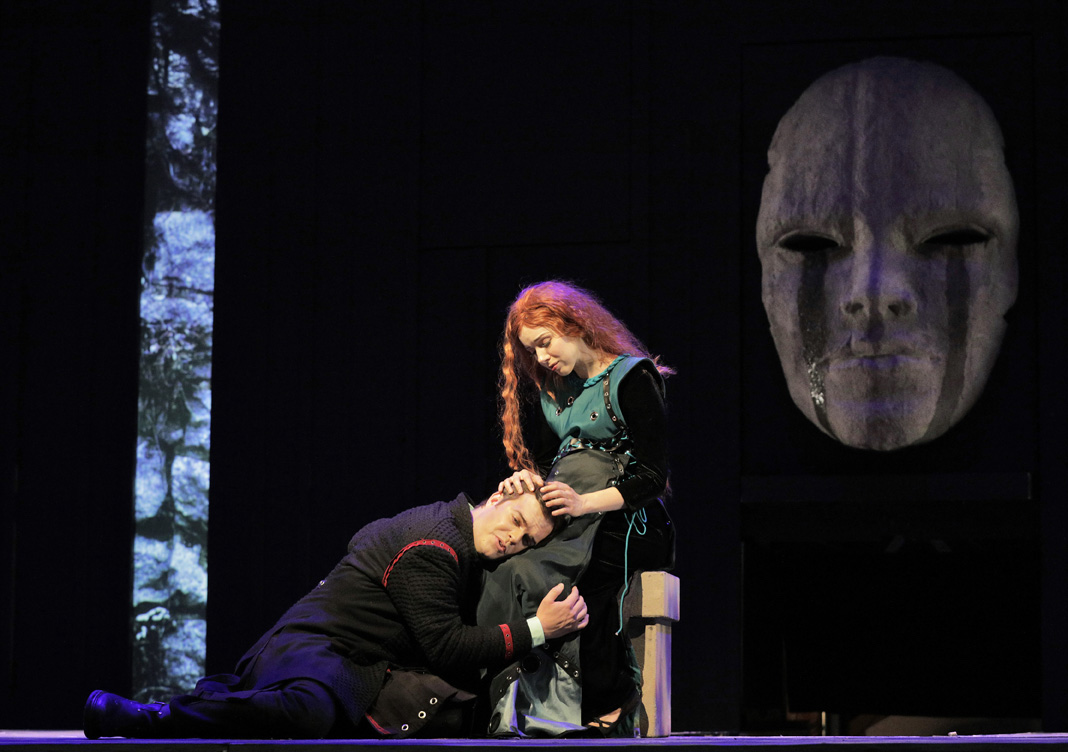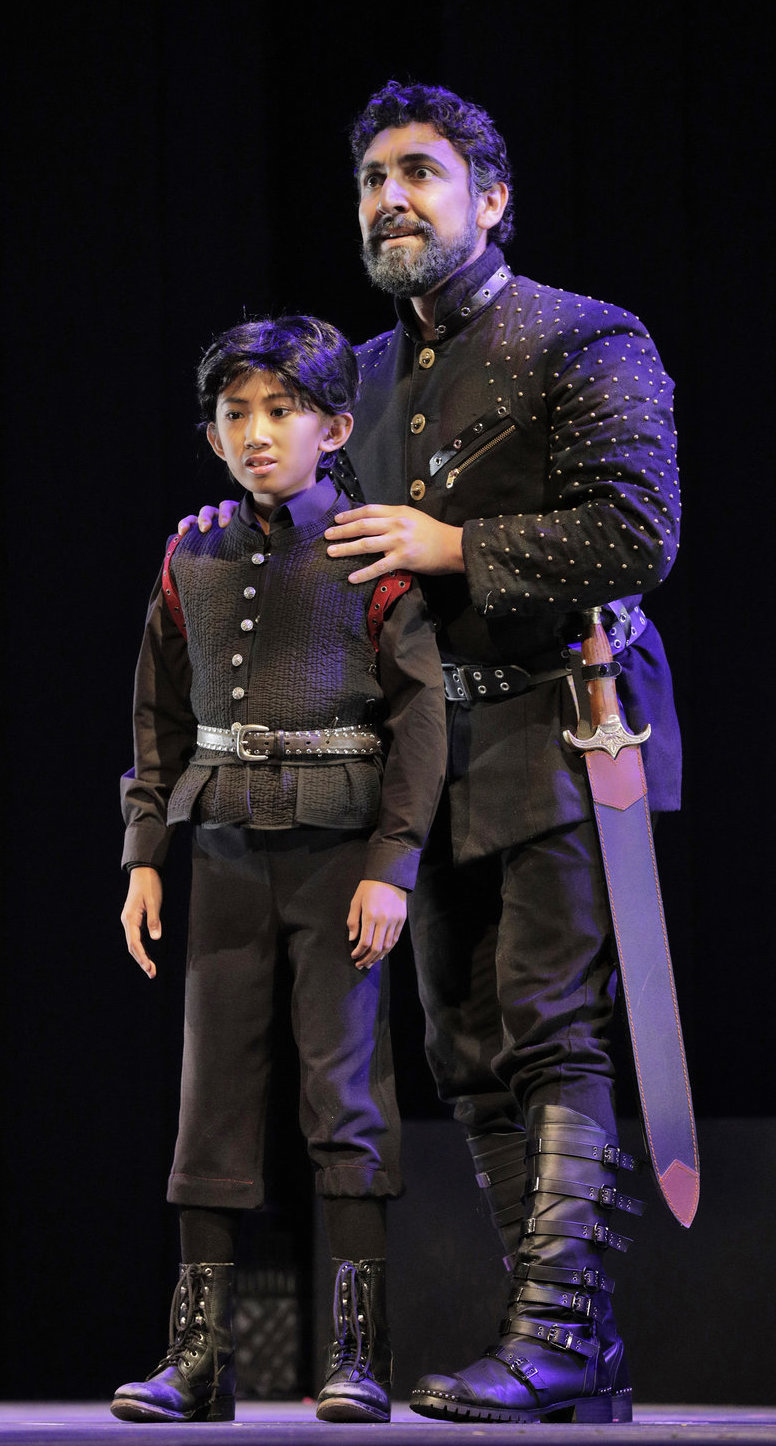West Edge Opera opened its 2018 season with an enchanting performance of Pelléas et Mélisande, the 1902 opera by Claude Debussy to the theater libretto of Belgian playwright and poet Maurice Maeterlinck. It was an inspired program choice, tenderly sung and evocatively produced, revealing what a fine jewel of a company West Edge Opera is. This year all West Edge Opera Festival performances take place at the Craneway Conference Center in Richmond.
Teetering between the end of 19th-century Romanticism and the beginning of 20th-century modernism, the opera is uniquely French and uniquely Debussy. Considered one of the most important and innovative operas of the period, Debussy’s opera moves away from the emphatic grandeur of the aria and large chorus. It is a setting that upholds the poetry of the libretto, washing it with sheer orchestral colors. Except for four scenes, Debussy used the play exactly as Maeterlinck wrote it.

The play exists in a timeless place, where fairy tales obliterate the historical and move into an atmospheric world. Here, the intimate becomes larger, opening into a universal theater of unspoken feelings and quietly momentous actions. Perfect for Debussy’s sensual and refined music.
The plot is simple. While hunting in a forest, the prince Golaud loses his way and finds a beautiful and mysterious young woman, Mélisande, weeping by a woodland pool. He marries her and brings her back to his country, which is suffering from famine under the rule of Golaud’s ailing father and aging grandfather. In their gloomy castle, Mélisande meets the young prince Pelléas. They fall in love, innocently, their sexuality submerged in luscious metaphor. Eventually, in a rage of jealousy Golaud kills his brother. Mélisande, shaken by the murder, dies giving birth to Golaud’s daughter.
Recalling the legend of Tristan and Isolde as well as Dante’s historically based Paolo and Francesca in which lovers are swept away into reluctant but illicit passion, the drama also uses the imaginary to spin the expected into the unexpected. In one scene Mélisande lets her hair fall down from the window in the castle’s tower to Pélleas below. Rather than climb up it like the prince in Rapunzel, he wraps himself in her hair, and uses it to adorn the trees around him. Although he asks to touch her hand, they cannot reach each other.
The opera is sung primarily by three characters, with an additional supporting couple; all of the singers were wonderfully accomplished and vocally gifted. Mezzo soprano Kendra Broom sang the central role of Mélisande, requiring her onstage for almost the entire two-and-half hours. She maneuvered through the score with grace, capturing Mélisande’s guilelessness of character while endowing the singing with a gorgeously complex and full sound. Pelléas was sung by tenor David Blalock, who infused his role with tenderness. Passion was the basis of baritone Efraín Solís’ interpretation of Golaud, whose growing despair and jealousy drives the opera toward inexorable death. Philip Skinner sang the role of King Arquel, Golaud and Pelléas’ grandfather, and contralto Malin Fritz sang Pelléas’ mother, Geneviéve.

One of the more poignant and subtly disturbing scenes was between Golaud and his 10-year-old son, Yniold. Golaud, frantic with jealousy, tries to force his son to confess that he has seen Mélisande’s infidelity, going so far as to lift Yniold up to spy on her through a window. Young soprano Erin Enriquez, who is a member of San Francisco Girls Chorus School, Level 4, sang this difficult role with naturalness and aplomb, countering and balancing the baritone’s growing intensity.
All this was supported by Musical Director Jonathan Khuner leading the West Edge Festival orchestra. Khuner also provided the orchestral reduction for the opera. Originally scored for full orchestra with complex divisions in the sections, especially the strings, the score provides a reduction challenge well met. From the first moments the sound was Debussy’s, and his evanescent lushness was maintained throughout, ever present in the wholly instrumental interludes that act as haunting transitions between scenes.
The production succinctly captured the enigmatic world of Pelléas et Mélisande, with a black set designed by Chad Owens. Beds or balconies rolled forward and then retreated into openings in the shadowy face of the set. Windows shaped in long strips or small squares opened and closed onto impressionistic and Pre-Raphaelite projections by Jeremy Knight, providing mere suggestions of place and time. Lighting was by Michael Oesch. Costumes were designed by Alina Bokovikova. Keturah Stickann provided savvy directing, adding a touch of the mystical to this excellent production.
– Jaime Robles
West Edge Opera presents Pelléas et Mélisande on August 12 and 17. All Festival performances take place at the Craneway Conference Center in Richmond.
For information and tickets visit westedgeopera.org.
